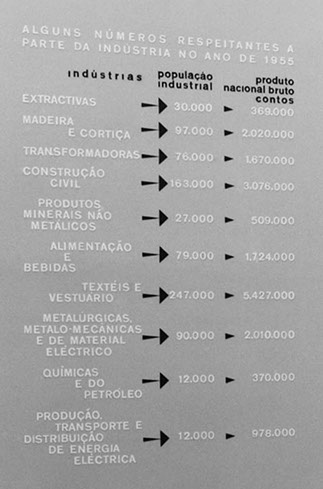















PLANOS DE FOMENTO

Em 1948, Portugal assinou o pacto fundador da OECE, integrando-se nas estruturas de cooperação previstas no Plano Marshall.* A participação na OECE reforçou a necessidade de um planeamento económico que conduziu à elaboração dos “Planos de Fomento” do Estado Novo.
Ainda que o I Plano (1953-1958) e o II Plano (1959-1964) dessem continuidade ao modelo de autarcia da ditadura liderada por Oliveira Salazar, no II Plano foi eleita a indústria transformadora de base como sector a privilegiar (siderurgia, refinação de petróleos, adubos, químicos…). Pela primeira vez, a política industrializadora é assumida sem ambiguidades, subordinando-se a agricultura que sofreria os efeitos positivos da industrialização.
Os anos 60 trouxeram alterações significativas à política económica portuguesa. No decurso do II Plano, o nosso país integrou-se na economia europeia e mundial: em Janeiro de 1960, Portugal está entre os países fundadores da EFTA (Associação Europeia de Comércio Livre) e, ainda no mesmo ano, dois decretos-lei aprovam o acordo do BIRD e do FMI; em 1962 assina-se, em Genebra, o protocolo do GATT.
A adesão a estas organizações marca a inversão na política da autarcia do Estado Novo e o Plano Intercalar de Fomento (1965-1967) enfatiza já as exigências da concorrência externa inerente aos acordos assinados e a necessidade de rever o condicionamento industrial, que se considerava desadequado às novas realidades.
Em 1968, a nomeação de Marcelo Caetano para o cargo de presidente do conselho evidencia com o III Plano de Fomento (1968-1973), o reforço de uma nova política económica do Estado Novo. A implementação deste novo Plano veio confirmar a internacionalização da economia portuguesa, o desenvolvimento da indústria privada como sector dominante da economia nacional e a subsequente consolidação dos grandes grupos económico-financeiros, bem como o crescimento do sector terciário com o consequente incremento urbano.
MHS
1957 FIL, Exposição de Indústria Portuguesa.
1957 FIL, Portuguese Industry Exhibition.
FOMENTATION PLANS
In 1948, Portugal signed OECE’s establishing pact, becoming part in the cooperation structures previewed in the Marshall Plan.* The participation in the OECE reinforced the need for an economic plan, which led to the elaboration of the New State’s “Fomentation Plans”.
Though the 1st Plan (1953-1958) and the 2nd Plan (1959-1964) gave continuity to the self-sufficiency model of the dictatorship led by Oliveira Salazar, in the 2nd Plan, the amount invested in the economy was enlarged, choosing the transforming industry base as a sector that had to be privileged (siderurgy, oil refinery, fertilizer and chemicals…). For the first time, the industrialized politics is assumed without any ambiguity and the agriculture will experience the positive effects of the industrialization.
The 60’s brought significant changes to the portuguese economic politics. In the course of the 2nd Plan, our country integrated the european and the world wide economy: in January 1960, Portugal is among EFTA’s (European Federal Trade Association) founder countries and, still in the same year, two decree-laws approve the BIRD and FMI agreement; in 1962, it is signed, in Geneva, the GATT protocol.
The adherence to these organizations marks a turning point in the New State’s self-sufficiency policy and the Intercalary Fomentation Plan (1965-1967) emphasizes the demands of the external concurrence inherent to the signed agreements and, the need to review the industrial conditioning, that was considered inappropriate to the new realities.
In 1968, Marcelo Caetano’s nomination as the Premier detaches with the 3rd Plan (1968-1973), the reinforcement of a new economic politics of the New State´s dictatorship. The implementation of this new Plan confirmed the internationalization of the portuguese economy, the development of the private industry as a leading sector of the national economy and the subsequent consolidation of the major economic and financial groups, as well as the growth of the tertiary sector with the consequent urban increase.
MHS
AS (transl.)
* Sobre este assunto vd. Maria Fernando Rollo (2007), Portugal e a Reconstrução Económica do Pós-Guerra. O Plano Marshall e economia portuguesa dos anos 50. Lisboa: Instituto Diplomático - Ministério dos Negócios Estrangeiros.
* On this subject vd. Maria Fernando Rollo (2007), Portugal e a Reconstrução Económica do Pós-Guerra. O Plano Marshall e economia portuguesa dos anos 50. Lisboa: Instituto Diplomático - Ministério dos Negócios Estrangeiros.

IADE-U Instituto de Arte, Design e Empresa – Universitário , Av. D. Carlos I, 4, 1200-649. Lisboa, Portugal | Tel: +351 213 939 600 | Fax: +351 213 939 610 | Email: designportugal@iade.pt | UNIDCOM / IADE
© 2014 PTDC/EAT-HAT/121601/2010
© 2014 WEBSITE & GRAPHIC DESIGN BY ANJOOM SATAR | IMAGE ED. BY MÁRCIA GOMES | COL. EMANUEL COSTA